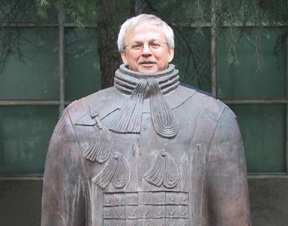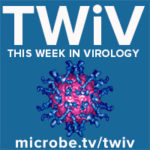 Hosts: Vincent Racaniello and Lynn Enquist
Hosts: Vincent Racaniello and Lynn Enquist
Vincent speaks with Lynn Enquist about his career in virology, moving from academia to industry and back. Along the way he did pioneering research on bacteriophage, participated in the birth of recombinant DNA technology, and studied herpesviruses.
Click the arrow above to play, or right-click to download TWiV #54 (63 MB .mp3, 87 minutes)
Subscribe (free): iTunes, RSS, email
Links for this episode:
- Holliday junction
- Asilomar Conference on Recombinant DNA
- Restriction enzymes
- Movies of herpesvirus movement in nerve cells
- The ‘other‘ Enquist lab
- Can you find the TWiV 54 hosts in this photo?
Weekly Science Picks
Lynn Francis Crick: Hunter of Life’s Secrets by Robert Olby
Vincent ViralZone
Send your virology questions and comments to [email protected].


You and Alan Dove have said in a previous episode that it's very unlikely that someone will produce a deadly virus. And I fully agree. Evolution is much better at this than humans.
But what about 1918 H1N1 sequences? It's very hard to make a new virus from scratch, but if you have the sequences and can make hole genes with it, can this be a shortcut?
Influenza viruses can be produced from the nucleotide sequence. The
technology has been published in a variety of scientific journals. The
1918 influenza virus has been produced from the nucleotide sequences
and there is no reason why it could not be done in other laboratories.
However, producing influenza viruses from the nucleotide sequence is
not 'kitchen biology': it requires a fairly sophisticated laboratory
and knowledge of the technique.
Influenza viruses can be produced from the nucleotide sequence. The
technology has been published in a variety of scientific journals. The
1918 influenza virus has been produced from the nucleotide sequences
and there is no reason why it could not be done in other laboratories.
However, producing influenza viruses from the nucleotide sequence is
not 'kitchen biology': it requires a fairly sophisticated laboratory
and knowledge of the technique.